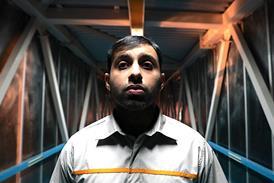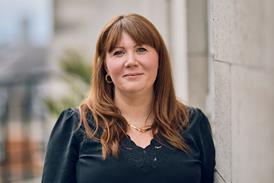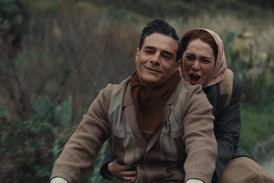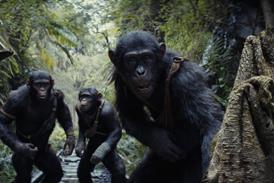Dir. Eytan Fox. Israel 2004. 93 mins.
Back in the opening slot of the Berlin Panorama for a repeat performance after last year's Yossi And Jagger, Israeli director Eytan Fox is no longer content with modest, intimate challenges. His new effort is part spy thriller, part psychological drama, and covers much ground, shot as it is on location in three different countries in three different languages and dealing with heavyweight issues like the link between the Holocaust and the Middle East conflict, on one side, and the beneficial influence of a gay friendship on a strict macho chauvinist, on the other side.
As such it is expansive and unusual enough to do well in unbiased middlebrow markets, although the combination of such vastly disparate themes, not to mention some of the suggestions thrown in along the way, may well rub many Germans and Israelis up the wrong way. But with Celluloid Dreams already signed on as sales agent, and the name of Lior Ashkenazi, one of Israel's key male draws after Lost Marriage, this looks like the kind of item that can't be ignored.
Eyal (Ashkenazi), a tough, single-minded Mossad agent, back home after successfully eliminating a Hamas operative in Istanbul, is devastated to find his wife has committed suicide, claiming in the note she left behind that she won't share her life with someone she considers an agent of death. Shocked out of his complacent self-confidence in the righteousness of his ways, he attempts to go back to work, but is bitterly disappointed when, instead of another dangerous mission, he has to assume the personality of a tourist guide and take a young German, Axel (Knut Berger), visiting his sister Pia (Caroline Peters) who works in a kibbutz, on a tour around Israel.
The idea is simple: getting close to these two should eventually put Eyal on the tracks of their grandfather, an infamous Nazi war criminal whom the Mossad had been trying to capture for many years. While his contact with the two siblings, both liberal and critical of their parents' generation, fails for a long time to deliver the expected results, Eyal can't help being affected by them. His insecurity may be subconscious at first but as he gets to know them better, his repressed doubts gradually surface.
Axel's openly avowed homosexuality is a bitter pill for Eyal's stiff, macho chauvinism; nor can he accept the indiscriminate sympathy Axel displays for other human beings, regardless of their national identity. But the reflective introspection triggered in him by his wife's death is irreversible. As he follows Axel to Germany, strikes a closer friendship with him and is invited to attend his father's 70th birthday party - where the dark, unrepentant aspects of Germany's immediate postwar generation are revealed - Eyal's vulnerability becomes more pronounced by the minute, reaching its climax in the moment of truth when he finally faces his target
Fox traces Eyal's emotional journey from what many critics of Sharon-style politics would define as the "ugly Israeli" stage, to a sensitive, loving human being, as he is depicted in the epilogue. But mixing this transformation up with the chase for a Nazi criminal, repressed German - and also Israeli - feelings of guilt and revenge and the humanising effect that new sexual options can have on a person is probably all too much for one film to handle.
Though the script addresses most of the relevant issues it has set for itself, treating them with compassion and care, the transitions in Eyal's character, which should provide the picture's backbone, are less than smooth, particularly at the stage when the plot moves from Israel to Berlin. The most unsettling issue of all is the suggestion of a direct link between the Holocaust and the Middle East conflict, a suggestion that everyone has a different perspective on.
Nicely shot and making the best of Israeli locations, Fox diligently moves his plot ahead and manages to keep dramatic interest alive throughout, helped by Berger's intelligent, sensitive performance as Axel - an excellent piece of casting, considering his inexperience - and the authoritative presence of Hanns Zischler and Carola Regnier as Alex's parents. Peters, whose credit is bigger than her role, fits in perfectly, but Ashkenazi seems better attuned physically than emotionally for the complexity of his part.
The weakest link here, however, is the tame, arbitrary finale. A more forceful, sensible ending would have been preferable after such outbursts as Eyal's spiteful aggression towards Alex's gay Arab acquaintance or the tirade of Alex's mother about Germany's past.
Production cos: Lama Films
Int'l sales: Celluloid Dreams
Exec prod: Moshe Edery, Leon Edery, Dodi Zilber, Micky Rabinovitz
Prod: Amir Harel, Gal Uchovsky
Scr: Gal Uchovsky
Cinematography: Tobias Hochstein
Ed Yosef Grunfeld
Prod des: Avi Fahima, Christoph Berg
Costumes: Peter Pohl, Rona Doron
Music: Ivri Lider
Sound des: Gil Toren
Main cast: Lior Ashkenazi, Knut Berger, Caroline Peters, Gidon Shemer, Yousef 'Joe' Sweid, Eyal Rozales, Sivan Sasson, special appearance by Hanns Zischler and Carola Regnier



















No comments yet